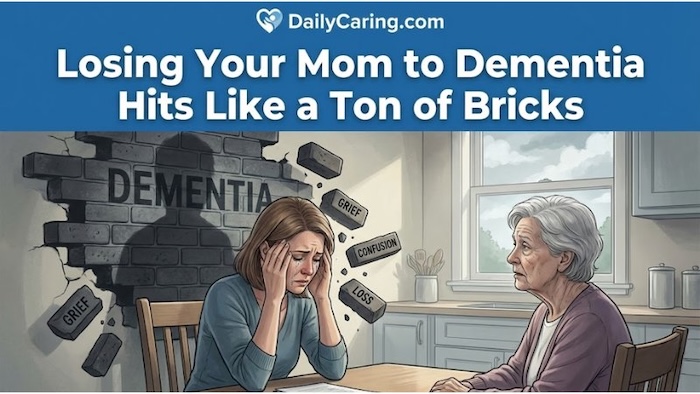Communication tips can reduce challenging Alzheimer’s behaviors
When someone with Alzheimer’s disease or dementia gets angry or agitated or refuses help, everyday life becomes even more challenging.
New communication styles can help you reduce challenging Alzheimer’s behaviors and improve the quality of life for both you and your older adult.

We found a free Alzheimer’s Association video featuring practical communication tips that have worked in countless real-life situations.
The tips are shared through stories from real caregivers, making them interesting, easy to follow, and relatable to everyday life.
Here, we've created an overview of the webinar with timestamps so you can quickly jump to the topics you’re most interested in.
VIDEO: Dementia Care Tips Based on Real-World Experiences
This Compassionate Communication video is helpful to both new and experienced caregivers.
In it, dementia educator Alexandra Morris shares tips for how to talk with seniors with dementia.
Alexandra is a gerontologist who has been solving complex Alzheimer’s care challenges for over 20 years. She truly understands what caregivers face.
Her talk is full of stories of the families she’s helped and the challenges they’ve overcome.
She shares creative ideas and role-playing scenarios that show how changing your responses can help your older adult become calmer and more positive.
Watching the video is like listening to a trusted expert who’s also a good friend.
Alexandra uses plain language and explains how symptoms often show up in real life.
Note: She sometimes uses the term “perseverance” or “perseverating.” That’s when someone keeps trying to do something over and over, even though they’re not able to succeed.
Overview of Compassionate Communication Video
This free video covers solutions for dozens of common dementia care scenarios.
It’s about an hour long and well worth watching, but as a busy caregiver, it might be more realistic to watch it in small increments.
Online videos are handy because you can watch them on your smartphone or computer when you have a few minutes.
We’ve outlined the major sections and their start times in the video. That way, you can jump to the parts you’re most interested in.
Alexandra is a natural storyteller and illustrates every point with scenarios and role-playing that bring the techniques to life.
1 minute
- Understand how the disease works and how it affects your older adult.
10 minutes 50 seconds
- Prevent and reduce challenging behaviors like refusing help, anxiety, wanting to overfeed pets, and more.
- Learn different communication methods like using body language, staying very calm, softening your words, and being flexible.
- Their environment affects someone with dementia.
- Adjust your approach, think ahead about tough situations, and let some things go.
- Match activities to abilities, break things down to small tasks.
- Choose kindness over truth if you can’t do both.
- Use humor appropriately.
47 minutes 30 seconds
- A list of key Do’s and Don’ts with plenty of helpful examples.
53 minutes
Using everyday situations, Alexandra role plays 7 scenarios that illustrate how the Do’s and Don’ts work in practice.
Scenarios include:
- Why do I have to go to the doctor? What’s wrong with me?
- I didn’t write this $500 check. Somebody is forging my signature!
- No one will make decisions for me. You can go now…and don’t come back!
- Who are you and where’s my husband?!
- I’m not eating this. I hate chicken!
59 minutes 15 seconds
- How to figure why difficult or worrying dementia behavior is happening – being the detective.
- Prioritizing what needs to be solved.
- Removing behavior triggers.
1 hour 2 minutes 20 seconds
- Get a summary of essential techniques with more real-life examples of how they defuse tough situations.
1 hour 6 minutes 30 seconds
Alexandra talks about the Alzheimer’s Association's services (most are free), including:
- 24/7 helpline
- Coaching families through challenging situations on a case-by-case basis
- Support groups for families and for those with early-stage dementia
- Medic alert safe return bracelet program for wandering
- Connecting people with research trials (whether you’re healthy or have a health condition)
Recommended for you:
- Understanding and Managing Dementia Behaviors: A Comprehensive Guide
- Therapeutic Fibbing: Why Experts Recommend Lying to Someone with Dementia
- Dementia and Anger: 9 Calming Strategies
Image: The Gold Standards Framework
Linking Disclaimer: The Alzheimer’s Association is not responsible for information or advice provided by others, including information on websites that link to Association sites and on third party sites to which the Association links. Please direct any questions to weblink@alz.org.
About the Author

Connie is the founder of DailyCaring.com and was a hands-on caregiver for her grandmother for 20 years. (Grandma made it to 101 years old!) She knows how challenging, overwhelming, and all-consuming caring for an older adult can be. She also understands the importance of support, especially in the form of practical solutions, valuable resources, and self-care tips.













